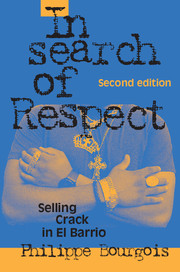Book contents
- Frontmatter
- Contents
- Acknowledgments
- Preface to the 2003 Second Edition
- Introduction
- 1 Violating Apartheid in the United States
- 2 A Street History of El Barrio
- 3 Crackhouse Management: Addiction, Discipline, and Dignity
- 4 “Goin Legit”: Disrespect and Resistance at Work
- 5 School Days: Learning to be a Better Criminal
- 6 Redrawing the Gender Line on the Street
- 7 Families and Children in Pain
- 8 Vulnerable Fathers
- 9 Conclusion
- Epilogue
- Epilogue 2003
- Notes
- Bibliography
- Index
- Other books in the series
7 - Families and Children in Pain
Published online by Cambridge University Press: 05 June 2014
- Frontmatter
- Contents
- Acknowledgments
- Preface to the 2003 Second Edition
- Introduction
- 1 Violating Apartheid in the United States
- 2 A Street History of El Barrio
- 3 Crackhouse Management: Addiction, Discipline, and Dignity
- 4 “Goin Legit”: Disrespect and Resistance at Work
- 5 School Days: Learning to be a Better Criminal
- 6 Redrawing the Gender Line on the Street
- 7 Families and Children in Pain
- 8 Vulnerable Fathers
- 9 Conclusion
- Epilogue
- Epilogue 2003
- Notes
- Bibliography
- Index
- Other books in the series
Summary
You know what's wrong with these girls nowadays? They only think of themselves. They only think of their sexual pleasures, their fun and their happiness. But they don't think of their kids first.
CandyDevelopmental psychologists and psychiatrists are generally considered to be the “experts” on early childhood socialization and family violence. Most of their large-scale, multimillion-dollar, cross-generational epidemiological surveys of “children at risk” conclude that the bulk of an adult's character is determined in infancy. Their statistical studies demonstrate that most battered children are virtually irremediable by the ages of six to eight. Furthermore, they assure us that a child does not have to be the object of physical violence to be emotionally scarred for life. Simply witnessing violence can induce long-term trauma.
In other words, according to the standard psychological theories of early childhood socialization, most people living in El Barrio, and certainly everyone in Ray's network and the crackhouses I frequented, might be dismissed as antisocial sociopaths because of their early childhood socialization experiences. Certainly, the gun-and-knife-wielding, knockdown fights between Candy and Primo that unfolded in front of twenty-year-old Tabatha, fourteen-year-old Junior, ten-year-old Jackie, four-year-old Mina, and one-year-old Lillian must have inflicted profound emotional scars. But once again, an individualistic, psychological – determinist approach misses the larger political economic and cultural context. It ignores historical processes and the effects of unequal power relations around class, ethnic, or gender and sexual categories.
- Type
- Chapter
- Information
- In Search of RespectSelling Crack in El Barrio, pp. 259 - 286Publisher: Cambridge University PressPrint publication year: 2002

